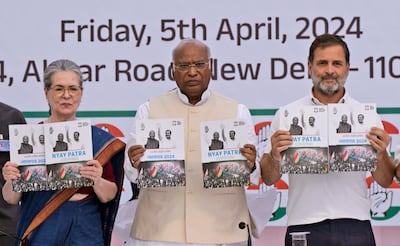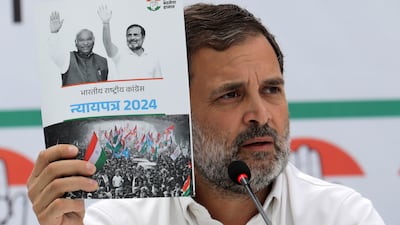India’s main opposition party the Indian National Congress has promised higher basic wages, job guarantees, affirmative action for castes and to uphold religious and personal freedoms, as it released its election manifesto less than two weeks before the national elections begin.
Nearly a billion voters are eligible to cast their votes in the 47-day-long election season that will be held in seven phases beginning April 19. The results will be announced on June 4.
The Indian National Congress, which is known as the “grand old party” and the main challenger to Prime Minister Narendra Modi’s government, outlined its promises made to voters in its “Nyay Patra” – justice document.
The manifesto was released by party president Mallikarjun Kharge, and leaders Sonia Gandhi and Rahul Gandhi in New Delhi.
“This manifesto of ours will be remembered in the political history of the country as a document of justice,” Mr Kharge said.
Political rivals and critics of Mr Modi’s party have accused the ruling Hindu nationalist government of undermining India’s democratic system and claim that the upcoming elections are a fight for upholding freedoms and democracy.
“This election is about those who are trying to destroy the constitution and destroy democracy in this country vs those who are trying to protect the constitution and protect democracy in this country,” Mr Gandhi said.
The centre-left party, which was formed before India’s independence and gave the country three prime ministers, had ruled for a decade before Mr Modi’s Bharatiya Janata Party stormed to power in 2014.
Some opinion polls and media commentaries have placed BJP ahead of its rivals in the polls riding on his popularity and Hindu first agenda, despite the country reeling under massive unemployment and economic disparity.
Reducing inequality
Tackling inequality is a central theme of the Congress manifesto, which includes commitments to economic redistribution.
“Once this fight is won, we look after the interests of the vast majority of our people, ensuring that India is not run by two to three large conglomerates, that it is run by the vast majority of the people, that we're not a nation of monopolies, and that we are a nation where there is fair competition among businesses,” Mr Gandhi said.
India, which has the world’s third highest number of billionaires, has witnessed an increased economic divide under Mr Modi’s rule, with one per cent of the population owning 40 per cent of the country's wealth, the highest in six decades, according to research group the World Inequality Lab.
Many critics say the growing economic disparity is a direct result of the ruling party’s rich-centric policies and accuse the BJP of crony capitalism.
The Congress manifesto promises to set a minimum wage of 400 rupees ($5) a day for tens of millions of unorganised sector workers and introduce 10 per cent reservation in jobs and education institutions for economically weaker sections.
At present, the national minimum wage is 178 rupees ($2.5).
The Congress has also promised to provide $1,200 to poorer families annually, without clarifying exactly who would receive the handout. It also promised cashless health insurance of up to 2.5 million rupees ($30,000).
It also pledged to bring in a law to guarantee minimum prices for crops, a demand farmers have protested for years against Mr Modi’s government.
The election manifesto pledged to overturn polices and laws introduced by Mr Modi’s government, including its Agnipath military recruitment scheme, which has been criticised for recruiting young Indians on four-year contracts without the employment benefits of full-time soldiers.

Religious and social freedom
The party has pledged to conduct a nationwide caste census to ascertain the socio-economic conditions of people of lower status and promised to bring constitutional changes to ensure their empowerment.
Tens of millions of India’s majority Hindu population continue to remain at a disadvantage and face daily systematic discrimination due to their caste, a rigid birth-linked hierarchy system within the Hindu religion.
The party has also promised to uphold the freedom of choice in dress, food, language, and personal laws for minorities, a direct challenge to Mr Modi’s policies to culturally homogenise the diverse nation of 1.4 billion people.
Hinduism forms the majority religious group in India, with around 80 per cent of the population following the faith, but the country has significant numbers of Muslims, Christians and Sikhs.
The promise is significant given the BJP’s government’s plank of Hindutva – the Hindu hegemony agenda propagated by right-wing ideology.

Since coming to power, Mr Modi’s government has resurrected the Hindu sentiments, pushing the majoritarian identity and capitalising on Hindu pride.
The ruling party has criminalised the consumption and slaughter of cows – an animal considered sacred by many Hindus – outlawed the Muslim practice of instant divorce and banned the hijab, the sale of halal food and faced claims of ostracising Muslims and their businesses.
Mr Modi’s party has pledged to end religion-based civil laws that govern marriage, divorce, and properties and bring a uniform law for all the communities. Muslims say this specifically targets them.
Mr Kharge said Congress offered opportunities and prosperity for Indians.
“This is not a claim or guarantee of any individual but the manifesto of a party which has a glorious history of 139 years. This will greatly accelerate the pace of socio-economic development of the country,” Mr Kharge said.
“It will open the closed doors of development for farmers, labourers, women, youth, poor and deprived sections.”


